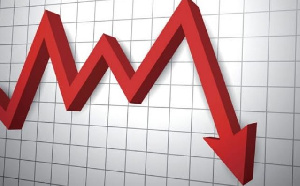Ghana’s inflation rate dropped its lowest level since the start of 2013, at 7.5 percent in May, which is less than the median of the Bank of Ghana’s target band of between 6 percent and 10 percent.
The fall in headline consumer price inflation from April’s level of 8.5 percent was announced by Government Statistician Samuel Kobina Annim last week in Accra. That’s the lowest rate since at least the start of 2013 and was lower than generally expected. Prices climbed 0.8 percent in the month.
The central bank’s monetary policy committee a fortnight ago predicted that the rate will be close to 8 percent by June.
At the same briefing last week, Governor Ernest Addison announced the committee’s unexpected move to cut its benchmark interest rate to 13.5 percent the lowest in more than nine years to support the recovery of the economy, even as cost pressures from new taxes and a 13% rise in transport fares are yet to reflect in price data. Indeed, at the time the rate cut was announced many economists criticized it accusing the BoG of having moved too soon and underestimated the impending inflationary pressures
However, the latest inflation data now supports the key interest rate cut, more so as the much awaited increase in commercial transport fares, announced a fortnight ago was just 13 percent, well below the widely anticipated 20 percent. Indeed, economists now suspect te BoG had been given advance notice of both the agreed increase in transport fares (which was announced the very next day after the interest rate cut was announced) and the sharper than expected fall in consumer inflation for May, and had factored both into its calculations.
Although inflation is expected to rise this month as the effects of both transport fare increases and the introduction of new taxes and levies take hold, it is unlikely that it can rise to more than the 10 percent ceiling of the BoG’s target band.
The inflation rate in the West African economy was above 11% in May, June and July last year at the peak of the pandemic and movement restrictions, creating a high base for comparing year-on-year price moves. That, and a relatively stable exchange rate, added to the drop in the headline number last month. Inflation is now below the midpoint of the central bank’s target range of 6-10% for the first time in history. This was driven by base effects and slowdown in imported inflation arising from the relative stability of the local currency during the period.
A “drop in the rate of inflation may make the Bank of Ghana feel vindicated in cutting the policy rate,” Courage Martey, an economist with Accra-based Databank Group, said by phone ahead of the release. “If subsequently, the rate goes up, then we expect to see the policy rate on hold for the rest of the year.”
Food-price growth, that helped to keep inflation above 10% for most of last year, slowed to 5.4 % from 6.5% in April. Non-food inflation was 9.2%. The unusual fall in food inflation mid way between the annual harvest now suggests that the relatively high food inflation during the latter part of last year was simply the result of COVID 19 instigated price distortions which are now being belatedly distorted.
The low inflation (coupled with a recent policy rate cut) has opened a window of opportunity for commercial banks to reduce lending rates to enhance credit to the private sector to support economic recovery efforts in 2021.
However, the analysts at Doobia.com, a leading financial markets analyses portal, doubt that commercial banks would embrace this window of opportunity given that they have historically struggled (or are unwilling) to quickly transmit such gains to the private sector via cheaper credit.
“We believe that the sharp decline in inflation by 100basis points to 7.5 percent reinforces the central bank’s decision to cut the benchmark monetary policy rate by 100bps to 13.5 percent last month” they agree. “This is likely to sustain the downward pressure on treasury yields in the short-term to help government lower its cost of funding, which is needed to help the authorities manage the country’s huge debt service burden and a precarious fiscal position. Short and medium term treasury securities have been on a downward trend since the beginning of the year as shown below.
“But while the government is set to reap the benefits via lower cost of funding, the challenge would be to transmit the benefits to the private sector via lower lending rates, especially given that commercial banks take time to adjust their lending rates in response to positive market developments in Ghana. The latest data from the central bank shows that the average lending rate only dropped marginally by 170bps since the start of the year to April 2021 despite inflation declining by 1.9 percentage points over the same period.
“While most banks have generally tightened credit conditions in response to the pandemic, we believe that the failure to transmit lower inflation and policy rates into cheaper credit for the private sector is also hampering credit demand. It is clear that attempts by the authorities to resolve the conundrum by devising new methods for calculating base lending rates are not having the desired effect on credit demand at the moment. And the status quo is likely to remain until the authorities find a way to make commercial banks more responsive to policy decisions and macroeconomic data releases.”
Source: goldstreetbusiness.com
 Home Of Ghana News Ghana News, Entertainment And More
Home Of Ghana News Ghana News, Entertainment And More






